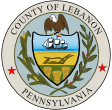Learn more about Lebanon AAA
Learn more about Lebanon AAA
In April of 1967, the Lebanon County Commissioners recognized the need for Aging services in Lebanon County and established the Office for the Aging. During this start-up phase of operation, the office was composed of part-time staff, and services offered at that time were primarily Meals on Wheels and a limited amount of casework and counseling services. The office continued functioning in this fashion up until 1972 and the flood of Hurricane Agnes. Several months after the flood, a grant was provided by the Pennsylvania State Legislature, through the Department of Public Welfare, to enable counties to establish programs and assist elderly, blind, or disabled persons who might have been victimized by the flood. Services expanded and full-time staff was hired via the use of these funds, so that by 1974 and the initiation of the Title VII Nutrition Program, The County Office for Aging was already rapidly becoming more of a focal point in administration and delivery of County Aging Services.
On January 10, 1974, subsequent to the Older Americans Act Amendments of 1973, the County Office for the Aging was officially designated an Area Agency on Aging by the State of PA and the County Commissioners. The agency was charged with the responsibility for the establishment of a comprehensive and coordinated service delivery system to be provided to the elderly residents of Lebanon County. At that time, the population to be served consisted of 14, 907 persons age 60 and over. Based on 2000 census data, this figure has risen to 24,855 or 20.7% of the County population. This constitutes a 67% increase of persons age 60 or over from 1970 to 2000. A high priority for assistance and services is to those individuals constituting a “target population.” These being:
- The older aging person, particularly those over 75 years of age
- Those with handicaps or functional disabilities
- Those living alone
- Persons existing on low incomes (at or below poverty level)
- Minority group members
- Those living in inadequate housing
On June 20, 1978, Governor Shapp signed into law Act 70 creating a statewide Department of Aging, thereby providing a cabinet level agency for the administration of comprehensive services for citizens over 60. Today, AAAs are being charged with providing more extensive counseling on long term living options and community based services to newly admitted nursing home residents. The Area Agency on Aging receives new admission reports twice per month and must make Long Term Living counseling visits in a timely manner, to prevent loss of community supports, housing, etc. The goal of this effort is to significantly increase the number of successful nursing home transitions each year.
The Lebanon County Area Agency on Aging, one of fifty-two such agencies in Pennsylvania is financed by a combination of Federal Funds (Older Americans Act), State General Funds, Local Public Funds, voluntary contributions derived from the service recipients, funds derived from the PA Lottery and Medical Assistance Programs.
The major objective and basic purpose of the Lebanon County Area Agency on Aging would be its function as the coordinative authority of all aging programs and services provided to the elderly of Lebanon County.
The major responsibility of the Area Agency on Aging is to contribute to the maximum individual functioning and optimal quality of life for all elderly within a designated “Planning and Service Area,” with emphasis placed on the prevention of unnecessary and inappropriate institutionalization of older persons.
The core functions of the Area Agency on Aging are: management and planning responsibilities, diagnostic intake, service management including assessment, programming and coordination, information and referral, organizing volunteer services, outreach, transportation services, data collecting and analysis, in-service training and staff development, program evaluation and technical assistance, operation of Multi- and Neighborhood Service Centers, and all other administrative services essential to support these functions.
